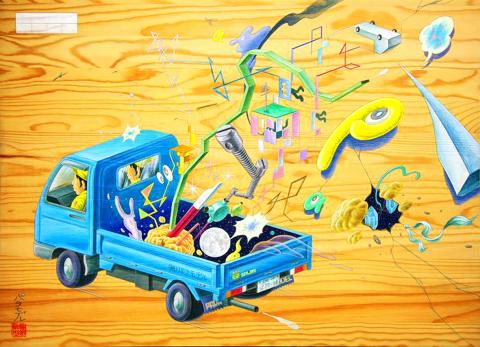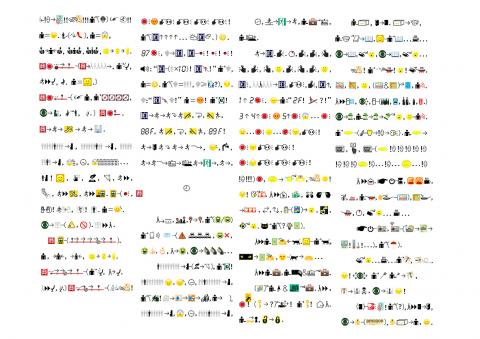Never Ending Construction is a group exhibition by three Japanese artists working in installation and painting. The paintings of Reika Nakayama, who resides in Mexico, feature a background of vivid, colorful patterns in acrylic paint, to which she has added dynamic pencil drawings of animals and human figures. Sakae Ozawa creates a playful world of little girls in billowing dresses flirting with flying whales and dancing bears. Paramodel, an “art unit” comprising Yasuhiko Hayashi and Yusuke Nakano, transforms the gallery space with their large installations comprising flowing lines and abstract geometric patterns.
■ Aki Gallery (也趣藝廊), 141 Minzu W Rd, Taipei City (台北市民族西路141號), tel: (02) 2599-1171. Open Tuesdays to Sundays from noon to 6:30pm
■ Opening reception on Saturday at 3pm. Until March 4

Photo Courtesy of Aki Gallery
Polyphony Beat (複音。節拍) is a dual exhibition of paper sculpture by Chu Wei-bor (朱為白) and Mia Liu (劉文瑄). The show seeks to show viewers the diversity and range of contemporary paper sculpture.
■ Kalos Gallery (真善美畫廊), 269, Dunhua S Rd Sec 1, Taipei City (台北市敦化南路一段269號), tel: (02) 2836-3452. Open daily from 10am to 6:30pm, closed Sundays
■ Opening reception on Saturday at 3pm. Until March 3

Photo Courtesy of Eslite Gallery
Book From the Sky to the Ground (從天書到地書) is a retrospective exhibit on the work of Chinese artist Xu Bing (徐冰). Xu’s installations question the notion that meaning can be communicated through language and how written words and symbols can be manipulated. In 1999, he received a MacArthur Foundation “genius” award for his originality and contribution to printmaking and calligraphy.
■ Eslite Gallery (誠品畫廊), 5F, 11 Songgao Rd, Taipei City (台北市松高路11號5樓), tel: (02) 8789-3388 X1588. Open Tuesdays to Sundays from 11am to 7pm
■ Opening reception on Saturday at 3pm. Until April 1
Wonderland: New Contemporary Art From Australia is a wide-ranging exhibition that surveys art from Down Under. The 45 artworks by 24 artists include found objects, sculpture, documentary video, painting and interactive installation. The “richly illustrated catalogue,” says MOCA’s press blurb, brings together “22 prominent critics to introduce the historical and cultural contexts within which each artist has evolved their practice.”
■ Museum of Contemporary Art, Taipei (MOCA, Taipei), 39 Changan W Rd, Taipei City (台北市長安西路39號), tel: (02) 2552-3720. Open Tuesdays to Sundays from 10am to 6pm. General admission: NT$50
■ Opening reception on Friday from 7pm to 9pm. Until April 15
In Girls — Spring (女孩春), Isa Ho (何孟娟) explores the traditional and (often) constricting roles of women in Taiwanese society and females’ quests for self-expression. Ho views her new series of photographs, which are shot from a bottom up perspective so that the viewer is constantly focused on the sky, as an “escape from the perspectives and values of seeing.”
■ InArt Gallery (加力畫廊), 315 Youai St, Tainan City (台南市友愛街315號), tel: (06) 221-3638. Open Tuesdays to Saturdays from 1pm to 9pm
■ Until March 11
Turning a Blind Eye (再見不尋常小事) is a joint exhibit of video and drawing by three Taiwanese artists. The videos of Chang Li-ren (張立人), winner of the 2009 Taipei Arts Awards (臺北美術獎), meditate on the changing ideas of beauty through images of women culled from Western art history. Lin Guan-ming’s (林冠名) drawings examine the estrangement of humans from the natural environment, which he views as a peculiar aspect of industrial and urban societies. Huang Hai-hsin (黃海欣) assembles news media images in videos that blur the line between fiction and reality.
■ Agora Art Space (藝譔堂), 104, Ln 155, Dunhua N Rd, Taipei City (台北市敦化北路155巷104號), tel: (02) 8712-0178. Open Tuesdays to Saturdays from 11am to 7pm
■ Until March 17

Following the shock complete failure of all the recall votes against Chinese Nationalist Party (KMT) lawmakers on July 26, pan-blue supporters and the Chinese Communist Party (CCP) were giddy with victory. A notable exception was KMT Chairman Eric Chu (朱立倫), who knew better. At a press conference on July 29, he bowed deeply in gratitude to the voters and said the recalls were “not about which party won or lost, but were a great victory for the Taiwanese voters.” The entire recall process was a disaster for both the KMT and the Democratic Progressive Party (DPP). The only bright spot for

As last month dawned, the Democratic Progressive Party (DPP) was in a good position. The recall campaigns had strong momentum, polling showed many Chinese Nationalist Party (KMT) lawmakers at risk of recall and even the KMT was bracing for losing seats while facing a tsunami of voter fraud investigations. Polling pointed to some of the recalls being a lock for victory. Though in most districts the majority was against recalling their lawmaker, among voters “definitely” planning to vote, there were double-digit margins in favor of recall in at least five districts, with three districts near or above 20 percent in

From Godzilla’s fiery atomic breath to post-apocalyptic anime and harrowing depictions of radiation sickness, the influence of the nuclear bombings of Hiroshima and Nagasaki runs deep in Japanese popular culture. In the 80 years since the World War II attacks, stories of destruction and mutation have been fused with fears around natural disasters and, more recently, the Fukushima crisis. Classic manga and anime series Astro Boy is called “Mighty Atom” in Japanese, while city-leveling explosions loom large in other titles such as Akira, Neon Genesis Evangelion and Attack on Titan. “Living through tremendous pain” and overcoming trauma is a recurrent theme in Japan’s

The great number of islands that make up the Penghu archipelago make it a fascinating place to come back and explore again and again. On your next trip to Penghu, why not get off the beaten path and explore a lesser-traveled outlying island? Jibei Island (吉貝嶼) in Baisha Township (白沙鄉) is a popular destination for its long white sand beach and water activities. However, three other permanently inhabited islands in the township put a unique spin on the traditional Penghu charm, making them great destinations for the curious tourist: Yuanbeiyu (員貝嶼), Niaoyu (鳥嶼) and Dacangyu (大倉嶼). YUANBEIYU Citou Wharf (岐頭碼頭) connects the mainland